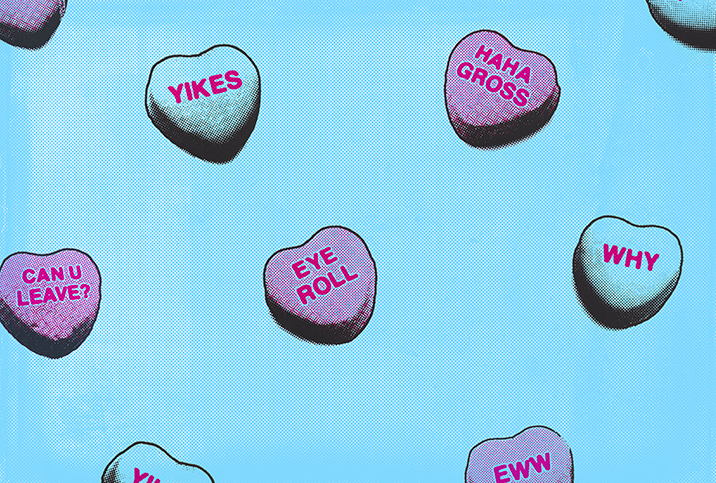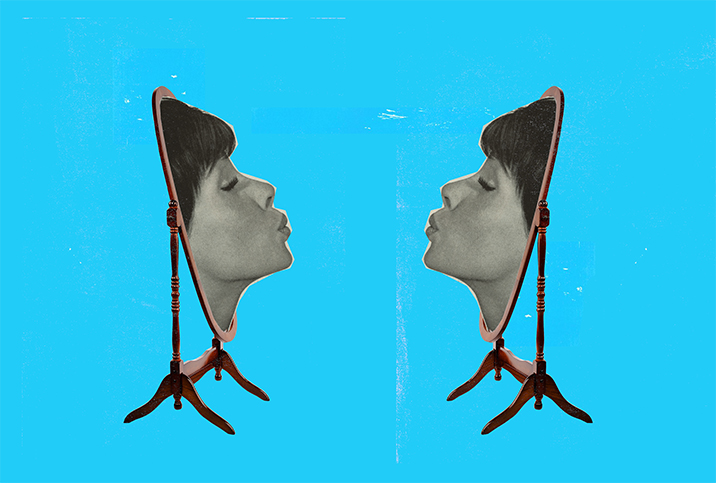Why We Chase People Who Reject Us

"The less my hope, the hotter my love," penned the Roman playwright Terence sometime between 195 and 159 B.C. The quote alone conjures decades of bygone unrequited crushes. For instance, my list of past unreciprocated loves (now in the double digits) is made up of mostly men—but it kicks off with a girl named Cecilia.
Although I identify as a straight woman now, I attended an all-girls middle and high school. From the ages of 12 to 16, I was confident I was a lesbian, and, specifically, that I was a lesbian for Cecilia.
There were several factors that made my crush on Cecilia deliciously futile: 1. We were a pair of teenage girls at a conservative-ish Catholic school. 2. Her father was a vocal Republican and homophobe (a word she didn't like to use, though, she explained to me once, since he wasn't afraid of gay people, he just didn't like them). 3. We ran in opposite friend groups—I with the theater nerds, she with the jocks. 4. She, in the way certain ninth-grade girls can be, was very mean to me. 5. My father had just accepted a job in the Bay Area, so we'd be leaving New England to move to California at the end of the school year, anyway.
'When you can't get what you want, you just want it more.'
Despite these very obvious hurdles, none of this stopped me from pining for Cecilia, journaling feverishly about her, confessing and chattering nonstop about my love for her to my open-minded friends, compulsively looking for hidden clues in the lyrics she posted on her AIM away messages and creepily videotaping closeups of her face with my camcorder when we made a documentary for a music class project, "Love Actually" wedding video-style.
Being in the ninth grade and in ill-fated love for the first time, I thought my adoration for Cecilia was true and eternal, and would never be replicated in fervor or magnificence, ever. Of course, I was wrong—she was followed by Jay, the friendly-but-boring junior varsity wrestler—then Bay, the tall, inordinately cocky theater major/frat boy, then Will, the mysterious Chicago restaurateur, then John, the troubled, lonesome standup comedian, Cody, the elusive drug dealer, and then Peter, the grouchy newspaper editor. Life, it sometimes seemed, was an unending parade of loves that were fiery but unreciprocated, or perhaps fiery because they were unreciprocated.
Frustration attraction
Helen Fisher, Ph.D., a biological anthropologist, a senior research fellow at The Kinsey Institute and chief science advisor for Match.com, gets it. In fact, she made up a term for the reason romantic rejection can get us hooked on a person: "Frustration attraction."
"When you can't get what you want, you just want it more," Fisher said, explaining the term to me in an interview.
Fisher, who has been studying romantic love for about two decades, has witnessed firsthand what goes on in the brain when you're spurned by your beloved. Fisher and her colleagues used functional MRI techniques in a 2010 study published in the Journal of Neurophysiology to analyze the brains of 15 subjects who were recently dumped by a romantic partner with whom they claimed to be intensely in love with.
"It was very difficult actually, putting these people in the machine, because they were in such bad shape," she later joked in her 2018 TED Talk. When participants were shown a photo of their former love, the regions in their brain associated with motivation, reward, addiction and craving are activated.
"When you're madly in love with someone, your right ventral tegmental area (VTA) starts becomes active and starts pumping out dopamine," she said. It's the same region of the brain that's activated when you feel the rush of cocaine. Hopped up on dopamine, scorned lovers may attempt bold, dramatic or even dangerous gestures to win the object of their affection.
"But romantic love is much more than a cocaine high—at least you come down from cocaine," Fisher mused in her TED Talk. "Romantic love is an obsession, it possesses you. You lose your sense of self. You can't stop thinking about another human being. Somebody is camping in your head."
What to do instead of chasing
The knowledge that there is brain chemistry driving my agony over romantic rejections was reassuring but not necessarily helpful in avoiding future heartache. For advice on managing unrequited adoration in a healthier way, I reached out to Austin, Texas matchmaker, dating, love and relationship coach Crista Beck.
While allowing that there's a fun, healthy, playful way to pursue someone you have a crush on, Beck continued: "But then there's chasing that's coming from a place of neediness; chasing that's coming from a lack from within oneself."
Interestingly, like Fisher, Beck drew a connection between obsessing over an evasive infatuation to abusing substances. "People avoid their own feelings and lots of different ways—by overworking or drinking or partying." (All three of which, by the way, I'd also been guilty of in the past.) "Obsessing is just another one of the ways that people avoid their own feelings."
If you find yourself obsessing over a person, Beck recommends taking a deep breath and asking yourself, "What are you really feeling? What are you really needing?"
She said, "If you can be grounded in your own self, be connected with your needs, be connected with your feelings, that's a much more powerful place to come from in dating."


















